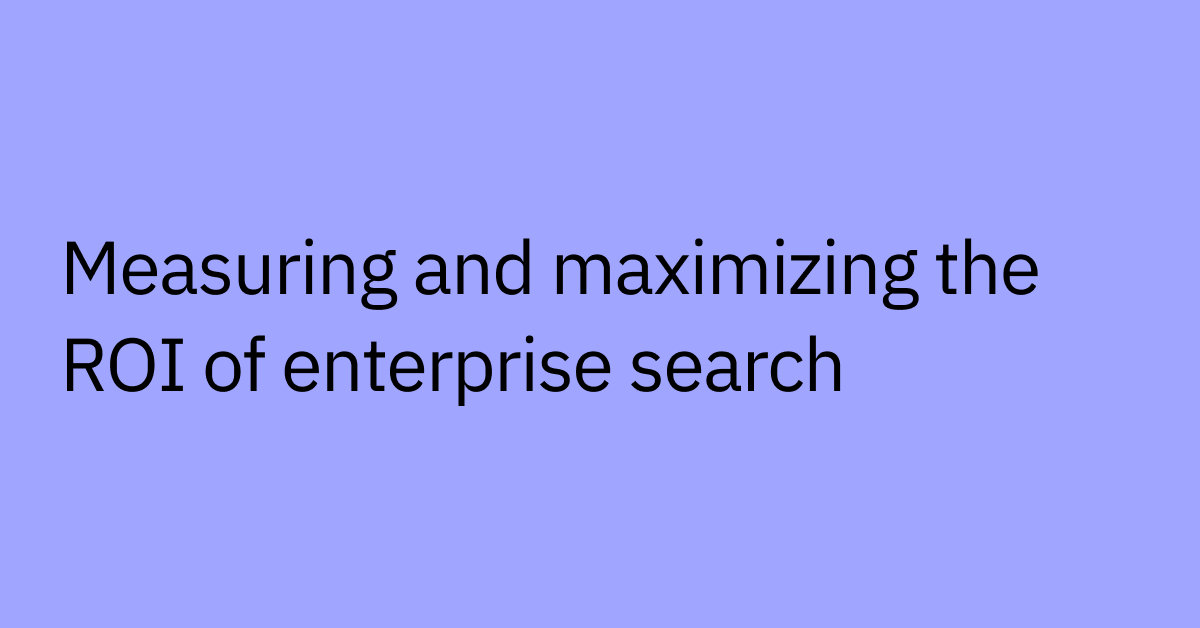Table of contents
Imagine this: your team is working on an important project, but they're having trouble finding the information and resources they need scattered across your company's databases, file servers, and intranets.
Valuable time and productivity are being lost as employees spend countless hours scouring disconnected systems, searching for the insights they need to make informed decisions and drive innovation. In fact, according to a McKinsey report employees spend 19% of their workday just searching for information. You know there's tribal knowledge buried in knowledge articles, slide decks, and reports — if only you could find it.
What you need is AI-powered enterprise search software that can intelligently understand your team's questions, quickly locate the relevant information across all your company data repositories, and deliver it directly — saving time, boosting efficiency, and fueling innovation.
In this blog, we'll dive into the world of AI-powered enterprise search software, exploring its capabilities and how it can transform the way organizations find and utilize information.
Specifically, you'll learn:
- What enterprise search software is and how it works
- The key benefits like increased productivity, efficiency, and maximizing tech investments
- High-value use cases across IT, HR, finance, operations, and other departments
- Potential challenges to consider when implementing enterprise search
- Where this transformative technology is headed next
- An overview of enterprise search software inclusive of:
- Internally built RAG solutions
- Moveworks
- Guru
- Glean
- Algolia
- Yext
- Coveo Relevance Cloud
- Elastic Enterprise Search
- IBM Watson Discovery
Whether you're looking to improve knowledge management, democratize data access, or optimize decision intelligence, this guide will showcase how enterprise search software can take your organization to the next level.
Attend Moveworks.global to discover the full potential of an AI-powered enterprise search solution and how genAI is being leveraged across the enterprise.
What is enterprise search software?
Enterprise search software provides a single point of access to locate information across all of an organization's digital assets and knowledge sources through a unified search experience. With this tool, employees can swiftly locate relevant information across an organization's data silos.
Unlike traditional search, which struggles to understand the true meaning behind a query and often limits results based on keywords alone, some enterprise search software leverages AI and natural language processing (NLP) to understand the intent and context behind queries. It can interpret complex questions, identify relevant concepts and entities, and surface the most pertinent information — whether contained in documents, databases, emails, chat logs, or other data repositories.
AI-powered enterprise search software
Beyond locating files and documents, AI enterprise search solutions powered by machine learning can extract key insights and semantic relationships buried in unstructured data, interpret questions asked through conversational search, automatically classify, enrich, and surface related content, learn and personalize results based on an individual's role and interests, and provide query-driven analytics and reporting across data sources.
Think of AI enterprise search software like a librarian for your organization. It goes beyond simple keyword matching and crawls across various repositories, from file servers to internal wikis, centralizing everything into a unified search experience. With this unfettered access to information, users can find what they need quickly and get back to doing what they do best.
Furthermore, advanced enterprise search solutions offer additional capabilities:
- Extract key insights buried in unstructured data
- Tailor searches based on individual roles and past interactions
- Provide insights into search queries and user behavior across data sources
By implementing enterprise search software, organizations can significantly boost employee productivity and knowledge sharing.
Potential challenges with enterprise search software
While enterprise search offers many benefits, there are some potential challenges to be aware of when picking the right software:
- Limited to certain file formats: If the software you’re using only understands certain file formats, like docs, that means it’s leaving all of the information in your enterprise behind — think about all of the key insights in your PDFs and slides!
- Data privacy and security: You need to be sure that when allowing unified access across all repositories, that sensitive data remains protected. The software you choose needs to adhere to the right permissions and ensure that only authorized users have access.
- Multi-lingual limitations: Many tools are built with a primary language in mind, but that’s not going to cut it for a global business with employees around the world. You need a software that speaks the language your employees do and can help them get access to every piece of knowledge in your organization, not just the ones written in their own language.
- Limited integrations: Your data isn’t all in one place, so with limited integrations, your enterprise search software is only seeing one piece of the puzzle. To provide a unified experience, your software needs to integrate with every application your employees use.
However, these issues can be mitigated by choosing the right enterprise search software. And there are plenty of ways to keep these challenges at bay.
Building your own AI-powered RAG enterprise search
Some companies also choose to build AI-powered search solutions in-house using Retrieval Augmented Generation (RAG). In this architecture, an LLM is connected to a vector-embeddings based retrieval system connected to a data source, or directly to a set of documents, and exposed to the user through a chat interface. The user can then query the underlying sources, and the RAG system provides summaries that are grounded in retrieved data. RAG results typically show significantly better quality of coherence and relevance of search results relative to prior keyword-based retrieval systems, often irrelevant blue links to knowledge sources.
However, as organizations tried to scale and operationalize these in-house RAG solutions, they started discovering core problems with RAG as an architecture: the fundamental friction around finding diverse, disjointed information across systems. Additionally, there are two fundamental issues that fuel the shortcomings of effective RAG search results: the challenge of accuracy and the challenge of hallucinations.
Why use enterprise search software?
Finding the right knowledge at the right time is essential for productivity, decision-making, and driving innovation. However, with data fragmented across many disparate systems, locating relevant insights can be like searching for a needle in a haystack.
Enterprise search software solves this by providing a centralized, intelligent search capability that connects all an organization's data sources. With this software, employees can quickly get the information they need to do their jobs more efficiently without getting bogged down.
Increase employee productivity
In the modern workplace, employees frequently find themselves bogged down searching for crucial information scattered across multiple systems and locations. This fragmentation significantly impedes productivity, as valuable time is squandered hunting for insights instead of actively working towards goals.
Enterprise search software addresses this challenge head-on by centralizing data from disparate sources into a unified, intelligent search platform. Envision a marketing manager seamlessly accessing last year's campaign reports with a few clicks, rather than spending hours digging through shared drives. This reclaimed productive time can be invested in strategic planning and creative execution, unlocking their full potential.
Increase agent bandwidth
The advantages of enterprise search extend far beyond individual productivity gains. With an AI-powered search capability, employees can self-serve and locate answers across the entire organization's knowledge bases, files, and help resources.
This self-service empowerment not only enhances employee autonomy but also relieves agent workloads. With the right software, a customer support professional can effortlessly retrieve documentation on a new product feature to resolve a customer inquiry independently, without escalating to an engineer. This frees agents to concentrate on higher-value tasks that drive innovation and growth.
Build employee trust
Equally crucial, the best enterprise search software fosters an environment of trust by grounding itself in the company's context, respecting existing data permissions, and transparently citing its sources.
During critical strategy meetings, when conflicting data points arise, team members can swiftly identify the most current and accurate information from authoritative sources, cultivating an atmosphere of confident, data-driven decision-making, enabling organizations to navigate complex challenges with clarity and certainty.
Who uses enterprise search software?
The best enterprise search software benefits employees across all roles and departments in an organization — from executives to frontline workers.
- Customer service and support teams: Quickly find answers in technical documentation, product guides, and knowledge bases to resolve customer issues faster and improve experiences.
- Sales and marketing teams: Locate the most relevant sales enablement materials, marketing assets, client information and analytics to accelerate the sales cycle and optimize campaigns.
- HR teams: Search across employee data, policies, procedures and other materials to streamline HR processes and service delivery.
- IT and operations teams: Retrieve infrastructure and system specs, applications data, and tribal knowledge for efficient troubleshooting and oversight of business technologies.
- Finance and legal teams: Compile and search secure financial records and legal documentation to ensure compliance, proper accounting, and preparedness.
- Engineering teams: Quickly locate relevant code snippets and information from past projects and find answers to technical questions buried within internal wikis and knowledge bases.
What to look for in enterprise search software?
Modern AI-powered search goes beyond simple keyword searches. From AI summarization to on-the-fly translation to controlled permissions — these are key features you need to be aware of when picking the right enterprise search software.
Key features of enterprise search software:
- Generative AI capabilities: Nobody wants to sift through dozens of lengthy documents and reports just to find the key pieces of information they need. Generative AI summarization automatically generates concise summaries of search results, saving you valuable time and preventing information overload. No more sifting through endless text — get straight to point and the most relevant information quickly.
- Accuracy: The goal of enterprise search is to deliver accurate, relevant results that directly answer the question being asked — not just a list of keyword-matched documents to sort through. With features like citations presence that makes every effort to fact-check for accuracy and link to citations where possible to help to solve for the distortion of information through hallucination. you can give employees more accurate answers with search results that can surface the most relevant sentences from different information sources.
- Security and permissions: Security features enable the protection of sensitive data and uphold data privacy regulations. Your enterprise search software needs to prioritize security, with granular permissions & access controls to enable the right employees to have access to the right information (and nothing more).
- Integrations: Your data resides in various applications and repositories. To provide a truly unified search experience, enterprise search software should integrate seamlessly with as many connectors as possible. Moveworks offers 100+ connectors that integrate Moveworks Enterprise Search to the most useful information repositories, as well as a way to add custom use cases for information retrieval from any system of record, — access all your information from a single, centralized location.
- User-friendly interface: Give your employees a single source of truth with an easy to use interface that acts as their central hub for answers, allowing them to search for information across all systems and file types in one place.
The top enterprise search software
Now that you've grasped the power of AI search, it's time to explore the leading vendors in the arena. The enterprise search market is rapidly evolving, with many vendors introducing AI-powered capabilities. Here's a quick rundown of some of the leading AI search solutions to consider:
Moveworks
Moveworks Enterprise Search leverages agentic AI to deliver the trustworthy and accurate answers that employees are actually looking for. Moveworks goes beyond just AI search, offering a centralized interface for employees to find information and get things done across all enterprise applications and file types.
Moveworks’ Enterprise Search solution enhances RAG with reasoning. It leverages a powerful Reasoning Engine that’s able to understand employee goals, develop intelligent plans, and search across various business systems to return top-quality search results.
Overview of Moveworks’ enterprise search capabilities
Features + AI capabilities
- Citations presence that makes every effort to fact-check for accuracy and link to citations where possible to help to solve for the distortion of information through hallucination.
- Deep integrations connect Moveworks Enterprise Search to the most useful information repositories and 100+ enterprise applications such as Zendesk, Confluence, Sharepoint, Dropbox, Google Drive, Salesforce, Notion, ServiceNow, Slack, Microsoft Teams, as well as a way to add custom use cases for information retrieval from any system of record.
- Granular permissions & access controls to enable the right employees to have access to the right information (and nothing more).
- Data volume and variety. Moveworks Enterprise Search scales to support the large data volumes and variety of business objects that are commonplace in the enterprise.
- Robust analytics to enable stakeholders to stay in the loop on adoption as well as usage, and make data-driven decisions on how to continuously improve the overall state of service for employees.
With these features, Moveworks is supporting significant advances in enterprise search capabilities with agentic RAG, helping to unlock noticeable upside for employees. Specifically:
- Answers that are more up-to-date and accurate
- Answers that are increasingly personalized at scale
- Answers hyper-relevant that help to enable engagement and wide-spread enterprise search adoption
It’s time to take your search to the next level. Break free from basic RAG and jump aboard enterprise search powered by agentic RAG with Moveworks Enterprise Search.
Guru
Guru is a knowledge management platform that uses AI to centralize information across different sources and surface relevant details to employees.
Overview of Guru’s enterprise search capabilities
Features
- Natural language answers: Provides direct answers to users’ questions rather than lists of documents
- Centralized knowledge base: Stores all your knowledge articles in one place, eliminating the need to search through scattered documents
- AI training center dashboard: Surfaces unanswered questions, allowing admins to address knowledge gaps
- Personalized search results: Delivers personalized knowledge recommendations based on user role, history, etc.
AI capabilities
- Semantic search: Allows Guru to provide relevant results without exact keyword matching
- Continuous learning: Considers your team's search history to improve the relevancy and accuracy of responses over time
Integrations
- Integration with popular enterprise apps including: Salesforce, Zendesk, Intercom, Slack, Microsoft Teams, Google Drive, Box, Dropbox, Sharepoint
Glean
Glean is an AI-powered search tool designed for businesses to find information across various work applications and internal data sources.
Overview of Glean’s enterprise search capabilities
Features
- Automated content tagging: Automatically tags content, making it easier to categorize and retrieve information within the system
- Personalized search results: Users receive search results tailored to their roles, projects, and interactions within the organization
- Collaborative knowledge sharing: Allows users to share, annotate, and contribute to knowledge repositories
- Contextual awareness: Analyzes user activity, search history, and role to personalize results and surface the most relevant information
AI capabilities
- Semantic understanding: AI-powered search engine employs advanced deep learning techniques to understand the semantic meaning behind queries
- Verification of up-to-date information: Ensures the accuracy and relevance of information by verifying it against a trusted knowledge model
- Intelligent information organization: Uses proprietary AI models to ingest, categorize, and extract insights from unstructured data
Integrations
- Integration with over 100 cloud apps and enterprise data sources, including: Confluence, Gmail, Jira, Microsoft Teams, Okta, OneDrive, Salesforce, Slack
Algolia
Algolia provides an enterprise search solution aimed at connecting users with relevant content and optimizing workplace efficiency.
Overview of Algolia’s enterprise search capabilities
Features
- Searchable content: Standard search functionality like filtering, faceting, and result ranking
- Developer-friendly: Empowers teams to build and customize applications with APIs, front-end libraries, and integrations
- Actionable user interface: User-friendly dashboard and API control for reporting, workplace search, UX management, configuration and A/B testing
AI capabilities
- Natural language understanding: AI-powered enterprise search relevance, personalization, and recommendations
Integrations
- Some key integrations include: Adobe, Zendesk, Contentful, and Salesforce Commerce Cloud
Yext
Yext offers a search solution for businesses with a focus on managing online presence across various channels.
Overview of Yext’s enterprise search capabilities
Features
- Search customization: Customizes result ranking, adding filters and facets, and even building a completely custom search interface.
- Knowledge graph: Connects various data points about your business (locations, products, services, etc.) into a central hub
AI capabilities
- Search result ranking: Continuously analyzes user search data and engagement to ensure the most relevant content surfaces at the top
- Semantic text search: Uses neural networks to understand the true meaning behind the query
- Dynamic ranking: Uses AI to identify and boost popular content
- Named entity recognition: Identifies words in each query and classifies them into entity types
Integrations
- Some key integrations include: Salesforce, Freshdesk, Zendesk, Sharepoint, OneDrive
Coveo Relevance Cloud
Coveo Relevance Cloud is a cloud-based enterprise search platform that aims to provide a unified search experience across various data sources, leveraging AI and analytics capabilities.
Overview of Coveo Relevance Cloud’s enterprise search capabilities
Features
- Unified search: Crawls through various data sources, including documents, emails, and customer support tickets, to create a central search index
- Personalization: Personalized search results based on user history, preferences, and role
- Predictive analytics: Keyword insights and search metrics help you understand what content is performing well and why
AI capabilities
- Semantic search: Goes beyond keyword matching to understand the intent behind a search query
- AI-driven recommendations: Recommends additional articles, products, or support resources
Integrations
- Some key integrations include: Salesforce, Sitecore CEP, Microsoft Outlook and SharePoint, SAP Commerce, Adobe Experience Manager, Google Drive, Box, Slack
Elasticsearch
Elasticsearch is a unified search platform leveraging natural language processing (NLP) to retrieve business data and insights intelligently across cloud sources, applications, and workplace documents.
Overview of Elastic Enterprise Search’s enterprise search capabilities
Features
- Data ingestion: Ingest data from various sources for search
- Federated search: Allows searching across multiple data sources simultaneously
- Search analytics: Provides basic analytics tools to understand search behavior
- Customization: Allows building custom search interfaces
AI capabilities
- Natural language processing (NLP): Analyzes user queries and retrieves relevant information based on meaning, not just keywords.
- Machine learning for search: Offers some machine learning tools for improving search relevance like vector search, hybrid search, and semantic search.
Integrations
- Some key integrations include: Cloud providers like AWS, Microsoft Azure, and Google Cloud, Salesforce, Microsoft 365, Slack, Confluence, Jira, Dropbox, Zoom
IBM Watson Discovery
IBM Watson Discovery is an AI-powered platform that uses natural language processing (NLP) to help businesses unlock insights hidden within their documents.
Overview of IBM Watson Discovery’s enterprise search capabilities
Features
- Smart document understanding: Helps the platform recognize document structure and extract information from elements like tables and headers
- Optical character recognition: Extracts text from images
- User-friendly training tools: Allows subject matter experts to train the platform without requiring coding knowledge
- Custom entity extraction: Lets organizations define custom entities for better extraction
AI capabilities
- Natural language processing (NLP): Provides basic NLP features like entity extraction and sentiment analysis
- Large language models (LLMs): Uses pre-built language models for text processing
Integrations
- Some key integrations include: Slack, Salesforce, Zendesk, AWS, Dropbox, Google Cloud, Microsoft 365, and Workday
The future of enterprise search is here
As organizations grapple with ever-growing data volumes across disparate systems, it's clear that traditional search methods are no longer sufficient. The future of finding information may increasingly involve AI-powered enterprise search software that can understand the true intent behind queries and surface the most relevant insights, regardless of where that knowledge resides.
Whether you're looking to boost productivity by empowering employees with self-service knowledge, accelerate operations through data-driven decision making, or drive innovation by democratizing information access, an AI-enhanced enterprise search solution is the key to unlocking your organization's full potential.
Want to see Moveworks’ enterprise search in action? Join our live product tour.



